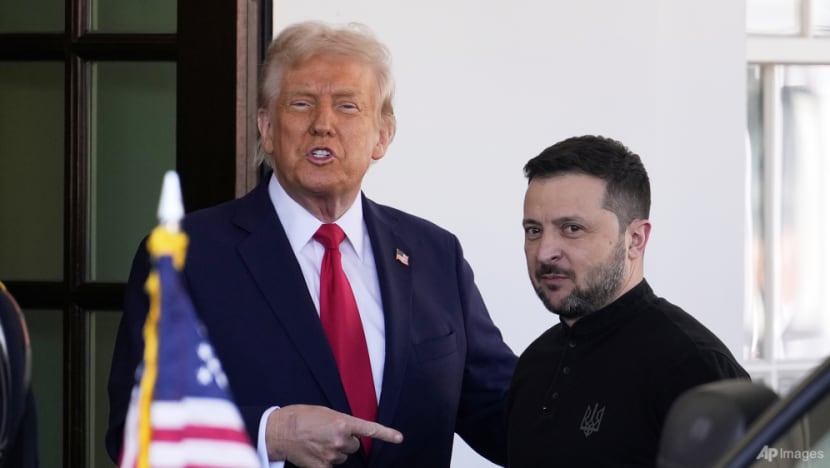World
European Leaders Meet Zelenskyy in Washington Amid Ukraine Crisis

European leaders will accompany Ukrainian President Volodymyr Zelenskyy in Washington on August 18, 2023, to discuss strategies aimed at ending Russia’s ongoing invasion of Ukraine. This visit comes after Donald Trump abandoned his push for an immediate ceasefire following a summit with Russian President Vladimir Putin in Alaska, where no significant breakthroughs were achieved.
During the Alaska summit, Trump had previously emphasized the need for a ceasefire, a demand that Ukraine and its European allies were excluded from addressing. However, after discussions with Putin that did not yield any concrete agreements, Trump dismissed the notion of a ceasefire, appearing to align more closely with Russia’s stance for negotiations. German Chancellor Friedrich Merz, French President Emmanuel Macron, and European Commission President Ursula von der Leyen are among the leaders expected to engage with Trump in Washington, expressing their concerns over the implications of this shift.
Ahead of the Washington meetings, von der Leyen announced on social media that she would welcome Zelenskyy in Brussels on Sunday, with other European leaders joining via video call. She confirmed her intention to accompany the Ukrainian president to the United States at his request, indicating a unified European front on this critical issue. The German government also confirmed Merz’s participation, who aims to highlight the urgency for a swift peace agreement in Ukraine.
Trump briefed Zelenskyy and European leaders during his flight back from Alaska, suggesting that all parties agreed that a direct peace agreement could be the most effective way to conclude the conflict. “Ceasefire agreements often do not hold up,” Trump noted on his Truth Social platform, which raised concerns among Ukrainian officials.
Zelenskyy has voiced skepticism regarding Trump’s new approach, stating that it complicates the situation further. He remarked that if Russia is unwilling to comply with basic orders to halt attacks, it would be challenging to foster a long-term peaceful coexistence with neighboring countries.
The discussions also touched on a controversial proposal from Putin, which would grant Russia full control over two predominantly Russian-held regions in Ukraine in exchange for a freeze on hostilities in others. An official briefed on the talks indicated that Putin’s demands effectively included Ukraine relinquishing control of Donbas, a region comprising the Donetsk and Lugansk areas. In return, Russian forces would halt their offensive in the strategic Black Sea port regions of Kherson and Zaporizhzhia.
Despite these discussions, Zelenskyy has remained firm on Ukraine’s territorial integrity, refusing to cede any ground in Donbas. Trump also signaled that the United States is prepared to provide Ukraine with security guarantees, an assurance that Merz described as “significant progress” in the diplomatic landscape.
European Union foreign affairs chief Kaja Kallas criticized the outcomes of the summit, accusing Putin of attempting to prolong negotiations without a genuine commitment to ending the conflict. “The harsh reality is that Russia has no intention of ending this war any time soon,” Kallas stated, highlighting the ongoing struggle in Ukraine.
As the focus shifts to Zelenskyy’s discussions in the White House on Monday, history looms large over the meeting. Zelenskyy’s previous visit to the Oval Office in February ended dramatically, with Trump and Vice President J.D. Vance publicly reprimanding him for not expressing sufficient gratitude for U.S. military support.
In the aftermath of the Alaska summit, Trump suggested that it is now up to Zelenskyy to secure a peace agreement, indicating a shift in responsibility for resolving the conflict. European leaders have welcomed the prospect of a trilateral summit involving Trump, Putin, and Zelenskyy, yet they emphasize the need to maintain pressure on Russia in the absence of a ceasefire.
As the situation continues to evolve, both Kyiv and Moscow have engaged in drone attacks over the weekend, underscoring the ongoing violence in the region. Back in Moscow, Putin characterized his discussions with Trump as “timely” and “very useful,” despite the lack of progress on key issues. In his remarks following the Alaska summit, he cautioned Ukraine and European nations against engaging in any “behind-the-scenes intrigues” that could disrupt what he described as “emerging progress.”
-

 Business5 months ago
Business5 months agoKenvue Dismisses CEO Thibaut Mongon as Strategic Review Advances
-

 Lifestyle4 months ago
Lifestyle4 months agoHumanism Camp Engages 250 Youths in Summer Fest 2025
-

 Sports4 months ago
Sports4 months agoDe Minaur Triumphs at Washington Open After Thrilling Comeback
-

 Sports5 months ago
Sports5 months agoTupou and Daugunu Join First Nations Squad for Lions Clash
-

 Top Stories5 months ago
Top Stories5 months agoColombian Senator Miguel Uribe Shows Signs of Recovery After Attack
-

 World5 months ago
World5 months agoASEAN Gears Up for Historic Joint Meeting of Foreign and Economic Ministers
-

 Health4 months ago
Health4 months agoNew Study Challenges Assumptions About Aging and Inflammation
-

 Business5 months ago
Business5 months agoOil Prices Surge Following New EU Sanctions on Russia
-

 Entertainment4 months ago
Entertainment4 months agoDetaşe-Sabah Violin Ensemble Captivates at Gabala Music Festival
-

 Entertainment4 months ago
Entertainment4 months agoBaku Metro Extends Hours for Justin Timberlake Concert
-

 Top Stories5 months ago
Top Stories5 months agoRethinking Singapore’s F&B Regulations Amid Business Closures
-

 Business5 months ago
Business5 months agoU.S. House Approves Stablecoin Bill, Sends to Trump for Signature









